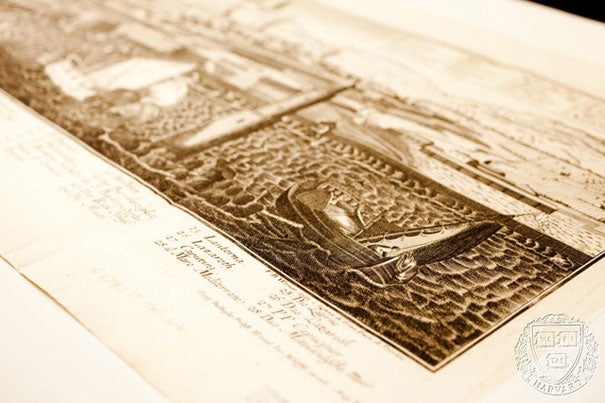
Graduate students can choose from a wide variety of workshops and recreational activities during January@GSAS, including a Harvard College Library seminar on Harvard’s digital map collection.
Courtesy of Harvard College Library
Beyond the lab and library
Graduate School offers career prep, skill-building workshops
This month’s to-do list offers opportunities far beyond the normal lab-and-library grind for Ph.D. and master’s students at the Graduate School of Arts and Sciences (GSAS).
For the second year running, GSAS is sponsoring a winter grab bag of seminars, workshops, and recreational activities designed to help its students recharge and build skills. Want to learn Spanish? Write a winning fellowship proposal? Bring your data to life? Tour the new wing at the Museum of Fine Arts? Get a leg up on the academic job market? At GSAS, students can do any of that this month.
More than 75 events, scheduled primarily between now and Jan. 21, make up January@GSAS, meeting students’ expressed desire for short, intensive workshops dedicated to topics such as public speaking, statistical analysis, research tools, language skills, and other pragmatic enrichment activities.
Partnering with institutions across campus, including the FAS Office of Career Services (OCS), the Harvard College Library (HCL), the School of Engineering and Applied Sciences, and the Institute for Quantitative Social Science, GSAS intended its series not only to stimulate new offerings targeted to graduate students, but to curate the best and most relevant of existing Harvard resources.
“We wanted to give our students as broad a range of opportunities as possible during the break between terms, but we also wanted to focus the offerings on professional development,” said GSAS Dean Allan Brandt. “With a fall term that feels more condensed than in the past, many of our students have had to focus solely on their own progress and their teaching responsibilities. They’ve told us they see January as a time not only to make headway on their dissertation work, but to catch up on all the other activities that are crucial to their scholarly success. Many of these workshops will serve those other pragmatic needs.”
Unlike Harvard undergraduates, GSAS students generally remain close to campus over break, connected to their departments and to their research, for much of January. The four GSAS residence halls stay open, and the Dudley Café, home to the GSAS meal plan, reopened Jan. 5. With the rigors of teaching and grading temporarily abated, this month is the logical time to look ahead and make use of Harvard’s extensive resources.
Among the professional development programs being offered, OCS has workshops providing first-person accounts of weathering the academic job market, advice on transitioning to nonacademic career paths, and strategies for building effective networking identities online. The GSAS Office of Fellowships will present an interactive boot camp, asking participants to bring and circulate drafts of the opening paragraphs of a fellowship proposal as the basis for discussion.
In the skill-building arena, HCL is offering workshops on locating numeric data, using Zotero to organize research materials, EndNote for the sciences, and an introduction to GIS and Google maps for research. And for teaching fellows, the Bok Center’s Winter Teaching Conference on Jan. 20 will provide pedagogical strategies, encouragement, and an important sense of community.
January@GSAS also includes 10 mini-courses taught by graduate students. These short courses, sponsored by the Graduate Student Council (GSC), are devoted to topics ranging from Russian literature, American art (taught at the Museum of Fine Arts), “instant” Spanish lessons, and biological interconnections to the math, science, and philosophy of the ordinary objects of everyday life. The GSC hopes these offerings will give graduate students “a chance to step back from the daily rigors of their own programs and to learn something new, whether purely for learning’s sake, or to help enrich their scholarly interests,” said the group’s president, Benjamin Woodring, a Ph.D. candidate in English.
The classes also provide valuable teaching experience for the instructors, who were selected from among many candidates in a proposal competition during the fall.
GSAS students and alumni can sign up for one or more of these courses and attend in full or in part. “Last year, in the first year of the program, we found that students were excited about the opportunity, and that the instructors really felt like they made a connection,” said Woodring. “This year, with a greater number of diverse course offerings, we’re building on that good first experience to take it to the next level.”
January is not all work. Social and recreational opportunities for GSAS students will abound. The roster of activities at Dudley House, the graduate student center, includes music, classic movie evenings, a WinterFest for kids, an Asian cooking class, a sports pub, and a tour of the new American wing of the Museum of Fine Arts, led by a Ph.D. student in history of art and architecture. Students also can tour the Harvard Art Museums and visit the glass flowers at the Harvard Museum of Natural History. The January calendar includes both of those opportunities, specially aimed for GSAS students.




